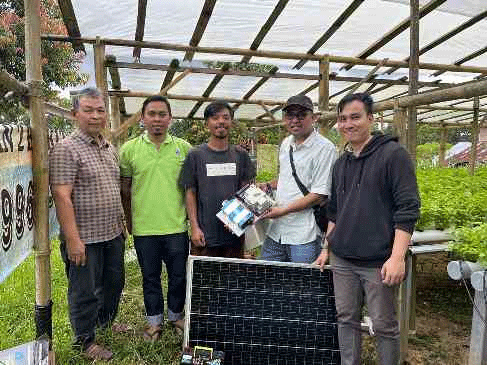This article explores how farmers in Nagari Lawang, West Sumatra, are leveraging solar power to enhance hydroponic vegetable production. Through the implementation of hybrid solar systems, they’ve overcome energy challenges, reduced costs, and ensured sustainable farming practices.
Nagari Lawang, located in the Matur district of West Sumatra, holds significant potential in hydroponic farming, particularly in the cultivation of vegetables like celery. Hydroponic farming offers numerous benefits, including water efficiency and faster crop growth, but a critical challenge persists—reliable electricity for powering water pumps. The hydroponic system relies heavily on a consistent water flow, and power disruptions can lead to significant crop losses.
Recognizing this challenge, a community service team from Universitas Negeri Padang (UNP) introduced a solution: a hybrid solar power system that integrates solar energy as the primary source and conventional grid electricity (PLN) as a backup. This hybrid system ensures that even during cloudy weather or at night, when solar energy is unavailable, the water pumps continue to function seamlessly using the grid power. This automatic transition between energy sources is managed by an Automatic Transfer Switch (ATS), which shifts back to solar power once the batteries have recharged enough to sustain the pumps.
The Implementation of Solar Hybrid Technology
The project began with the installation of key components such as solar panels, energy storage batteries, inverters, and the ATS. The solar panels were strategically mounted near the hydroponic installations to maximize sunlight exposure. Once tested in the lab, the team moved forward with on-site installation, connecting the solar system to the water pumps that drive the hydroponic system.
With solar power now ensuring a continuous 24-hour water flow, the pumps run efficiently without interruptions. This continuous operation is critical for maintaining optimal nutrient and oxygen levels in the water, which are crucial for healthy plant growth.
Dr. Ali Basrah Pulungan, the leader of the UNP community service team, emphasized the importance of this technology for the farmers: “The hybrid system allows farmers to manage their hydroponic systems more independently. Solar energy is a sustainable and environmentally friendly solution that reduces reliance on conventional electricity.”
Increased Productivity and Reduced Costs
The implementation of the solar hybrid system has brought immediate benefits to the local hydroponic farming community. Ibnu Rachmad Tanjung, a member of the farmer group, expressed his gratitude for the positive impact of the technology. “Thanks to this solar energy system, we no longer worry about power disruptions. Our plants are growing better, production has increased, and our electricity costs have decreased significantly,” he noted.
The positive impact extends beyond the farming community. Local residents have also gained insights into how technology can improve everyday life. One community member shared, “This initiative has not only helped the farming group but also introduced us to how technology can make life easier. We’re grateful for this knowledge and support.”
A Model for Sustainable Agriculture
The success of the hybrid solar energy system has positioned Nagari Lawang as a model for integrating renewable energy into agriculture. By reducing dependency on conventional electricity, farmers are not only lowering their operating costs but also contributing to environmental sustainability. The project demonstrates the potential for solar power to support agricultural production in rural areas, especially where grid electricity may be unreliable or costly.
The results are tangible: with uninterrupted water flow, plant growth is more consistent, crop yields have improved, and energy costs have significantly dropped. This program serves as a successful example of how renewable energy can enhance agricultural efficiency and improve the economic well-being of rural communities.
The adoption of hybrid solar power in Nagari Lawang’s hydroponic systems highlights the significant role renewable energy can play in modern agriculture. By solving the issue of unreliable electricity, farmers have not only increased their productivity but also set a new standard for sustainable farming practices. The success of this initiative presents a scalable model that can be replicated in other regions of West Sumatra and across Indonesia, offering a path toward sustainable and efficient agriculture.











